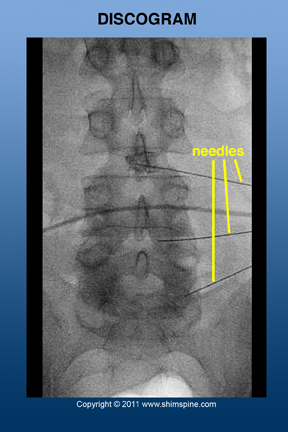Discograms
Discograms
In rare instances your doctor may order a test called a provocative discogram. It is usually followed by a CT scan. 
This is an invasive test that is utilized primarily after the decision for surgery has already been made. Not all physicians believe the information gained by this test is useful so you need to discuss this with your doctor.
The test is usually performed by an interventional radiologist, pain specialist or your surgeon. You are brought into a fluoroscopy suite and under image guidance, needles are placed within the disks. Fluids are introduced into the discs. Normal healthy discs do not have pain when injected. Other discs, when injected, can manifest with pain. If the injection reproduces the pain in the back and legs, then it is considered concordant. This is where it becomes controversial. Some surgeons, would then recommend surgical fusion, or other treatments for that disc level.
Patients need to have a good undestanding of the mechanics of this test. It is invasive, and has potential complications including infection, increasing pain, and nerve irritation. Recently, there has been a study indicating that disks are at risk of degeneration after discograms are performed.
Again, the same concept of risks versus benefits need to be discussed. Discograms are used for the pre-operative planning by a certain percent of physicians. Also, if the Discogram does not have a concordant response, it may indicate that surgery would not have a predictable good result. It may indicate not all the disk levels need surgery. It may indicate too many levels are involved so that surgery would not predict a good outcome. In our practice, we do find discography useful in certain situations.
The risks are as above, plus it can be painful. Also, you may also undergo a CT scan, which has issues with radiation exposure.
Last modified: October 22, 2019









